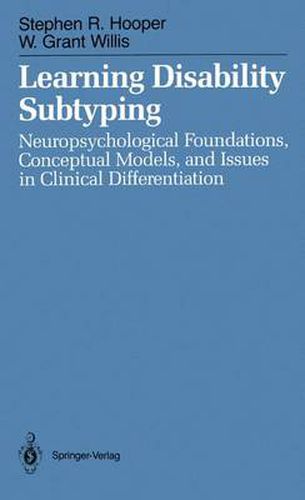Readings Newsletter
Become a Readings Member to make your shopping experience even easier.
Sign in or sign up for free!
You’re not far away from qualifying for FREE standard shipping within Australia
You’ve qualified for FREE standard shipping within Australia
The cart is loading…






This title is printed to order. This book may have been self-published. If so, we cannot guarantee the quality of the content. In the main most books will have gone through the editing process however some may not. We therefore suggest that you be aware of this before ordering this book. If in doubt check either the author or publisher’s details as we are unable to accept any returns unless they are faulty. Please contact us if you have any questions.
The publication of this very important volume comes at a timely juncture in the history of learning disabilities. The focus of this volume is on developing a multidisciplinary understanding of the complexities of the research on learning disabilities and its various sUbtypes. It also will serve as an important compendium of the subtyping literature, particularly with respect to pertinent issues of nosology, specific sUbtyping models, neuro psychological diagnosis, and treatment. As the authors so correctly suggest, the differential diagnosis of learning disabilities subtypes is a critical first step in developing theoretically sound programs of psychoeducational intervention. Clearly, one must have some idea about the general abilities of a child before realistic expectations can be charted. Also, how can one plan a program of intervention without some knowledge of the deficient components of achievement within a do main? Does it not make both conceptual and practical sense to identify an individual’s relative strengths and weaknesses so that abilities or strengths can be utilized to optimize functioning in areas of deficit? Although these all sound like reasonable precursors to assisting individuals in need of academic assistance, there are those who would argue otherwise. Impor tantly, however, the Director of the National Institutes of Health, in a recent report to Congress, advocates exactly what this volume proposes. Indeed, there are important needs to be addressed, and the literature reviewed herein strongly supports the conclusions drawn by these authors.
$9.00 standard shipping within Australia
FREE standard shipping within Australia for orders over $100.00
Express & International shipping calculated at checkout
This title is printed to order. This book may have been self-published. If so, we cannot guarantee the quality of the content. In the main most books will have gone through the editing process however some may not. We therefore suggest that you be aware of this before ordering this book. If in doubt check either the author or publisher’s details as we are unable to accept any returns unless they are faulty. Please contact us if you have any questions.
The publication of this very important volume comes at a timely juncture in the history of learning disabilities. The focus of this volume is on developing a multidisciplinary understanding of the complexities of the research on learning disabilities and its various sUbtypes. It also will serve as an important compendium of the subtyping literature, particularly with respect to pertinent issues of nosology, specific sUbtyping models, neuro psychological diagnosis, and treatment. As the authors so correctly suggest, the differential diagnosis of learning disabilities subtypes is a critical first step in developing theoretically sound programs of psychoeducational intervention. Clearly, one must have some idea about the general abilities of a child before realistic expectations can be charted. Also, how can one plan a program of intervention without some knowledge of the deficient components of achievement within a do main? Does it not make both conceptual and practical sense to identify an individual’s relative strengths and weaknesses so that abilities or strengths can be utilized to optimize functioning in areas of deficit? Although these all sound like reasonable precursors to assisting individuals in need of academic assistance, there are those who would argue otherwise. Impor tantly, however, the Director of the National Institutes of Health, in a recent report to Congress, advocates exactly what this volume proposes. Indeed, there are important needs to be addressed, and the literature reviewed herein strongly supports the conclusions drawn by these authors.